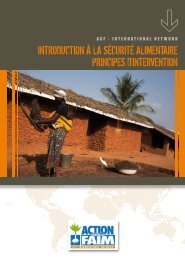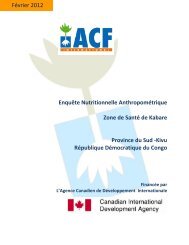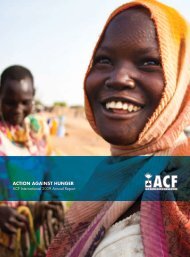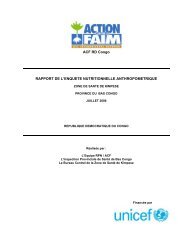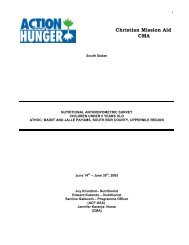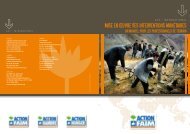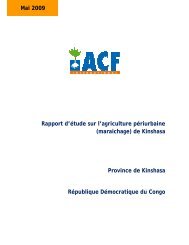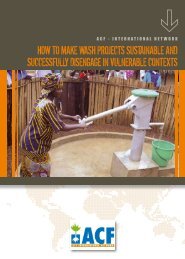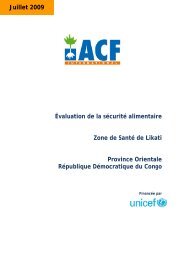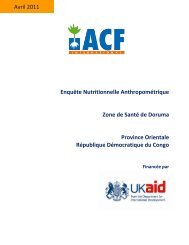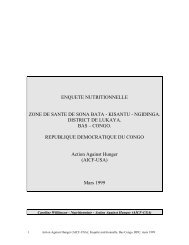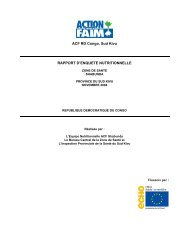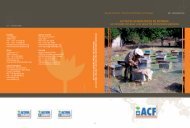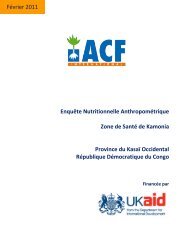Participatory Evaluation of our 2008 - Action Against Hunger
Participatory Evaluation of our 2008 - Action Against Hunger
Participatory Evaluation of our 2008 - Action Against Hunger
You also want an ePaper? Increase the reach of your titles
YUMPU automatically turns print PDFs into web optimized ePapers that Google loves.
4.6 Improvement in participant coping strategy index scores<br />
The short duration <strong>of</strong> the FFS programme and its partial production cycle mean that significant<br />
changes to the type, frequency, or severity <strong>of</strong> household coping strategies cannot be expected.<br />
The FAO data nonetheless suggest which coping strategies are more expected among the ACF<br />
groups, which in turn can support more informed future programme design that includes<br />
anticipated changes in coping strategies: 13<br />
Figure 20. Frequency <strong>of</strong> coping strategy use in ACF FFS programme areas 14<br />
4<br />
Participant<br />
Non-Participant<br />
3<br />
2<br />
1<br />
0<br />
Rely on less<br />
perferred/expensive<br />
food<br />
Borrow food, rely on<br />
friend/relative<br />
Purchase food on<br />
credit<br />
Gather wild fruit,<br />
hunt<br />
Harvest immature<br />
crops<br />
Consume seed<br />
stock for next<br />
season<br />
Send children to eat<br />
with neighb<strong>our</strong>s<br />
Send HH members<br />
to beg<br />
Limit portion size<br />
per meal<br />
Restrict<br />
consumption by<br />
adults for children<br />
Feed working HH<br />
members at<br />
expense <strong>of</strong> nonworking<br />
Ration money to buy<br />
prepared food<br />
Reduce number <strong>of</strong><br />
meals/day<br />
Skip entire days<br />
without meals<br />
S<strong>our</strong>ce: FAO evaluation data<br />
The list <strong>of</strong> coping strategies is not exhaustive and is in fact concentrated specifically around food<br />
shortages. This is a narrowly conceived picture <strong>of</strong> coping that does not include, for example,<br />
(productive and non-productive) asset sales for meeting food or cash needs. There is no significant<br />
difference between the frequency <strong>of</strong> coping strategies reported by ACF participants or the control<br />
group. In fact, for most <strong>of</strong> the nine strategies the ACF average score is essentially equal to the<br />
control. This suggests that the FFS programme did not influence household resilience against<br />
particular coping strategies, otherwise a greater difference would be expected between the ACF<br />
participant and control scores in Figure 20 above.<br />
To begin understanding and evaluating programme-related coping strategies, the evaluation tried<br />
to establish relative degrees <strong>of</strong> severity by using pairwise ranking, the results <strong>of</strong> which are<br />
summarised below:<br />
Figure 21. Relative severity <strong>of</strong> coping strategies 15 Opejal Aceno Oyoro<br />
Coping Strategy<br />
Score Rank Score Rank Score Rank<br />
Rely on less preferred, less expensive food 0 0 1 4 0 7<br />
Borrow food from friend or relative 4 3 3 3 5 2<br />
Purchase food on credit 2 4 4 2 4 3<br />
Consume wild foods and animals 6 1 3 3 3 4<br />
Reduce the portion size <strong>of</strong> meals 1 5 1 4 1 6<br />
Reduce the number <strong>of</strong> meals per day 2 4 3 3 2 5<br />
Skip entire days without meals 5 2 6 1 6 1<br />
Unfortunately the discussions around the ranking lacked sufficient time to probe further into the<br />
rationale behind the ranking or to elaborate specifically what types <strong>of</strong> households employ which <strong>of</strong><br />
the strategies at what time <strong>of</strong> year. The ranking nonetheless suggests how ACF might weigh<br />
coping strategies for its planned surveillance activities and future monitoring. These data could<br />
13 CARE/WFP (2003) The Coping Strategies Index: Field Methods Manual.<br />
14 FAO used the following weighted scale: 0 = never, 1 = hardly at all (less than once/week), 2 = once in a while (oncetwice/week),<br />
3 = very <strong>of</strong>ten (1-6 times/week), 4 = all the time (every day).<br />
15 The evaluation team neglected to complete the ranking process in Aceno for lack <strong>of</strong> time, resulting in a three-way tie<br />
for third and a two-way tie for f<strong>our</strong>th. These should have been resolved through additional rounds <strong>of</strong> pairwise ranking to<br />
produce a clear hierarchy like those completed in Opejal and Oyoro parishes.<br />
<strong>Action</strong> <strong>Against</strong> <strong>Hunger</strong> Uganda - 37 - Farmer Field School <strong>Evaluation</strong>



